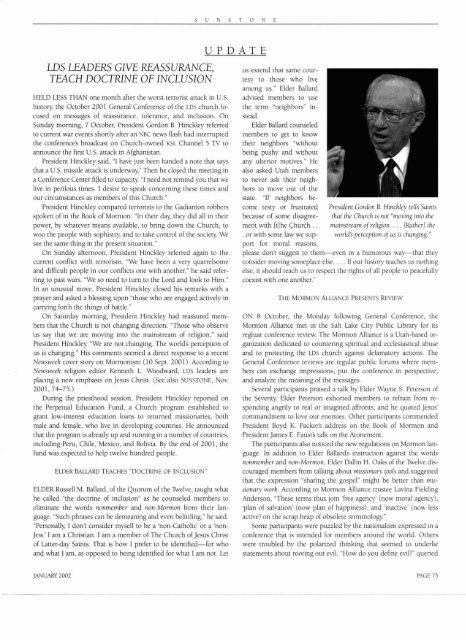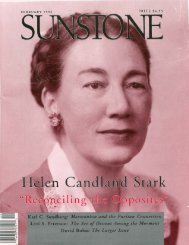Eugene England - Sunstone Magazine
Eugene England - Sunstone Magazine
Eugene England - Sunstone Magazine
You also want an ePaper? Increase the reach of your titles
YUMPU automatically turns print PDFs into web optimized ePapers that Google loves.
LDS LEADERS GIVE REASSURANCE,<br />
TEACH DOCTRINE OF INCLUSION<br />
HELD LESS THAN one month after the worst terrorist attack in U.S.<br />
history, the October 2001 General Conference of the LDs church focused<br />
on messages of reassurance, tolerance, and inclusion. On<br />
Sunday morning, 7 October, President Gordon B. Hinckley referred<br />
to current war events shortly after an NBC news flash had interrupted<br />
the conference's broadcast on Church-owned KSL Channel 5 TV to<br />
announce the first U.S. attack in Afghanistan.<br />
President Hinckley said, "I have just been handed a note that says<br />
that a U.S. missile attack is underway," Then he closed the meeting in<br />
a Conference Center filled to capacity "I need not remind you that we<br />
live in perilous times. I desire to speak concerning these times and<br />
our circumstances as members of this Church."<br />
President Hinckley compared terrorists to the Gadianton robbers<br />
spoken of in the Book of Mormon. "In their day, they did all in their<br />
power, by whatever means available, to bring down the Church, to<br />
woo the people with sophistry, and to take control of the society. We<br />
see the same thing in the present situation."<br />
On Sunday afternoon, President Hinckley referred again to the<br />
current conflict with terrorism. "We have been a very quarrelsome<br />
and difficult people in our conflicts one with another," he said referring<br />
to past wars. "We so need to turn to the Lord and look to Him."<br />
In an unusual move, President Hinckley closed his remarks with a<br />
prayer and asked a blessing upon "those who are engaged actively in<br />
carrying forth the things of battle."<br />
On Saturday morning, President Hinckley had reassured members<br />
that the Church is not changing direction. "Those who observe<br />
us say that we are moving into the mainstream of religion," said<br />
President Hinckley "We are not changing. The world's perception of<br />
us is changing." His comments seemed a direct response to a recent<br />
Newsweek cover story on Mormonism (10 Sept. 2001). According to<br />
Newsweek religion editor Kenneth L. Woodward, LDS leaders are<br />
placing a new emphasis on Jesus Christ. (See also SUNSTONE, Nov.<br />
2001, 74-75.)<br />
During the priesthood session, President Hinckley reported on<br />
the Perpetual Education Fund, a Church program established to<br />
grant low-interest education loans to returned missionaries, both<br />
male and female, who live in developing countries. He announced<br />
that the program is already up and running in a number of countries,<br />
including Peru, Chile, Mexico, and Bolivia. By the end of 2001, the<br />
fund was expected to help twelve hundred people.<br />
ELDER BALLARD TEACHES "DOCTRINE OF INCLUSION"<br />
ELDER Russell M. Ballard, of the Quorum of the Twelve, taught what<br />
he called "the doctrine of inclusion" as he counseled members to<br />
eliminate the words nonmember and non-Mormon from their language.<br />
"Such phrases can be demeaning and even belittling," he said.<br />
"Personally, I don't consider myself to be a 'non-Catholic' or a 'non-<br />
Jew.' I am a Christian. I am a member of The Church of Jesus Christ<br />
of Latter-day Saints. That is how I prefer to be identified-for who<br />
and what I am, as opposed to being identified for what I am not. Let<br />
UPDATE<br />
us extend that same courtesy<br />
to those who live<br />
among us." Elder Ballard<br />
advised members to use<br />
the term "neighbors" instead.<br />
Elder Ballard counseled<br />
members to get to know<br />
their neighbors "without<br />
being pushy and without<br />
any ulterior motives." He<br />
also asked Utah members<br />
to never ask their neighbors<br />
to move out of the<br />
state. "If neighbors become<br />
testy or frustrated President Gordon B. Hinckley tells Saints<br />
because of some disagree- that the Church is not "moving into the<br />
ment with [tlhe Church . . mainstream ofreligion. . . . [Rather] the<br />
. or with some law we sup- world's perception of us is changing."<br />
port for moral reasons,<br />
please don't suggest to them-even in a humorous way-that they<br />
consider moving someplace else. . . . If our history teaches us nothing<br />
else, it should teach us to respect the rights of all people to peacefully<br />
coexist with one another."<br />
THE MORMON ALLIANCE PRESENTS REVIEW<br />
ON 8 October, the Monday following General Conference, the<br />
Mormon Alliance met in the Salt Lake City Public Library for its<br />
regluar conference review. The Mormon Alliance is a Utah-based organization<br />
dedicated to countering spiritual and ecclesiastical abuse<br />
and to protecting the LDs church against defamatory actions. The<br />
General Conference reviews are regular public forums where members<br />
can exchange impressions, put the conference in perspective,<br />
and analyze the meaning of the messages.<br />
Several participants praised a talk by Elder Wayne 5. Peterson of<br />
the Seventy. Elder Peterson exhorted members to refrain from responding<br />
angrily to real or imagined affronts, and he quoted Jesus'<br />
commandment to love our enemies. Other participants commended<br />
President Boyd K. Packer's address on the Book of Mormon and<br />
President James E. Faust's talk on the Atonement.<br />
The participants also noticed the new regulations on Mormon language.<br />
In addition to Elder Ballard's instruction against the words<br />
nonmember and non-Mormon, Elder Dallin H. Oaks of the Twelve discouraged<br />
members from talking about missionary tools and suggested<br />
that the expression "sharing the gospel" might be better than missionary<br />
work. According to Mormon Alliance trustee Lavina Fielding<br />
Anderson, "These terms thus join 'free agency' (now moral agency),<br />
'plan of salvation' (now plan of happiness), and 'inactive' (now less<br />
active) on the scrap heap of obsolete terminology."<br />
Some participants were puzzled by the nationalism expressed in a<br />
conference that is intended for members around the world. Others<br />
were troubled by the polarized thinking that seemed to underlie<br />
statements about rooting out evil. "How do you define evil?" queried<br />
JANUARY 2002<br />
PAGE 75

















